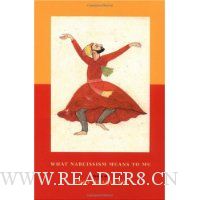基本信息·出版社:Graywolf Press ·页码:78 页 ·出版日期:2003年00月 ·ISBN:1555973868 ·International Standard Book Number:1555973868 ·条形 ...
| 商家名称 |
信用等级 |
购买信息 |
订购本书 |
|
|
 |
What Narcissism Means to Me: Poems |
 |
|
 |
What Narcissism Means to Me: Poems |
 |

基本信息·出版社:Graywolf Press
·页码:78 页
·出版日期:2003年00月
·ISBN:1555973868
·International Standard Book Number:1555973868
·条形码:9781555973865
·EAN:9781555973865
·装帧:平装
·正文语种:英语
内容简介 在线阅读本书
An eagerly awaited new collection of poems by contemporary favorite Tony Hoagland, author of Donkey GospelHow did I come to believe in a government called Tony Hoagland?With an economy based on flattery and self-protection?and a sewage system of selective forgetting?and an extensive history of broken promises?--from "Argentina"
In
What Narcissism Means to Me, award-winning poet Tony Hoagland levels his particular brand of acute irony not only on the personal life, but also on some provinces of American culture. In playful narratives, lyrical outbursts, and overheard conversations, Hoagland cruises the milieu, exploring the spiritual vacancies of American satisfaction. With humor, rich tonal complexity, and aggressive moral intelligence, these poems bring pity to our folly and celebrate our resilience.
作者简介 Tony Hoagland is the author of
Donkey Gospel, winner of the 1997 James Laughlin Award of the Academy of American Poets, and
Sweet Ruin, winner of the Brittingham Prize in Poetry. He teaches at the University of Pittsburgh.
媒体推荐 Hoagland?s collection has the appeal of a mean-but-funny friend?he?s so entertaining and?so spot on in his insights. --
New York Times Book Review, Nov. 9, 2003 专业书评 From Publishers Weekly"How did I come to believe in a government called Tony Hoagland?/ with an economy based on flattery and self-protection?" How indeed. In Hoagland's third collection, as in the previous two, his speaker devotes considerable energy to unmasking this vulnerable self, revealing its ugliness, hatred and social sensitivity in articulate detail. A typical poem begins masochistically: " `Success is the worst possible thing that could happen / to a man like you,' she said, / `because the shiny shoes, and flattery / and the self-/ lubricating slime of affluence would mean / you'd never have to face your failure as a human being.' "-and then goes on to concede, perhaps predictably, that "anyway, she was right about me...." In milder poems, which often revolve around eating dinner, drinking wine and hanging out with friends (typically other creative writing professors), he explores a more social self, slipping into a "he said, she said" mode, and reporting at great length on friends' witticisms: "Kath says February is always like eating a raw egg;/ Peter says it's like wearing a bandage on your head; / Mary says it's like a pack of wild dogs who have gotten into medical waste,/ and smiles because she clearly is the winner." Hoagland funnels 21st-century corporate detritus into his more Whitmanesque impulses, in which he begins to explore a sweeping and explicitly American identity oriented by Radio Shacks and K marts. His attempts to branch out with satires of anthropological reportage, particularly about black people, can be somewhat embarrassing: "Black for me is a country/ more foreign than China or Vagina,/ more alarming than going down Niagara on Viagra...." Readers will probably prefer the poems about sitting alone in a room or drinking wine with Dean Young.
Copyright © Reed Business Information, a division of Reed Elsevier Inc. All rights reserved.




